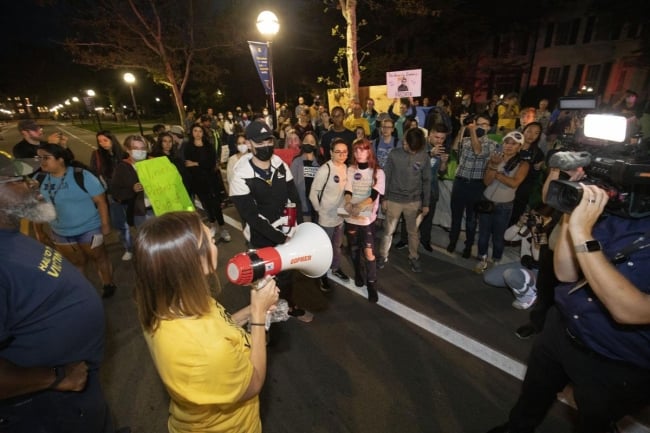You have /5 articles left.
Sign up for a free account or log in.

A vigil for sexual assault survivors, including victims of former University of Michigan doctor Robert Anderson, took place last October across the street from former Michigan president Mark S. Schlissel’s home.
Bill Pugliano/Getty Images News/Getty Images
The University of Michigan announced Wednesday that it had reached a $490 million settlement agreement with attorneys representing more than 1,000 survivors of alleged sexual abuse by former, now-deceased university doctor Robert Anderson.
The agreement, if approved, would resolve all the survivors’ claims against the university. A total of $460 million would be available to the approximately 1,050 current claimants, and another $30 million would be reserved for potential future claimants who join the settlement before July 31, 2023.
The agreement is the most recent in a series of mega-settlements reached by universities to resolve claims in cases involving hundreds or more victims alleging sexual assault by university-employed physicians.
Michigan State University reached a $500 million agreement in 2018 with 332 claimants alleging sexual abuse by former university doctor Larry Nassar.
Ohio State University agreed to $46.7 million in settlement agreements in 2020 with 185 survivors alleging abuse by former, now-deceased university physician Richard Strauss.
And the University of Southern California has agreed to pay more than $1.1 billion to settle claims of sex abuse involving former university gynecologist George Tyndall, including an $852 million settlement agreement reached with 710 former patients of Tyndall last year.
Michigan hired Anderson as an associate physician in its University Health Service in 1966, and he remained employed by the university in various roles—including as University Health Service director, team physician in the athletic department and in clinical faculty appointments at Michigan’s medical school—until his retirement in 2003.
An external investigation commissioned by the university found that over the course of his 37 years at the university, Anderson “engaged in sexual misconduct with patients on countless occasions.”
The investigative report by the law firm Wilmer Hale said Anderson’s “misconduct ranged from performing medically unnecessary hernia and rectal examinations on patients seeking treatment for wholly unrelated issues, to manually stimulating male patients and causing them to ejaculate, to quid pro quo arrangements in which he provided medical services in exchange for sexual contact.”
The investigation found that rumors of Anderson performing inappropriate exams began circulating “almost immediately” after he was hired.
“The University received contemporaneous information about Dr. Anderson’s misconduct from multiple sources,” says the investigative report, which was released last May. “A senior University administrator was told about Dr. Anderson’s misconduct several times between 1978 or 1979 and 1981 but did not take appropriate action. Concerning information was also shared with other University personnel. Although the information these individuals received varied in directness and specificity, Dr. Anderson’s misconduct may have been detected earlier and brought to an end if they had considered, understood, investigated, or elevated what they heard.”
Michigan has been engaged in mediation talks with Anderson’s reported victims since October 2020 through a court-appointed mediation process overseen by Victoria A. Roberts, U.S. district court judge for the Eastern District of Michigan. The announced agreement must still be approved by Michigan’s Board of Regents and by 98 percent of the claimants, as well as by the court.
Michigan has new interim leadership in place after former president Dr. Mark A. Schlissel was fired over the weekend for an alleged inappropriate relationship with a subordinate.
Jordan Acker, the chair of Michigan’s Board of Regents, said Wednesday the settlement agreement “takes an important step toward a future of healing for our community.”
“Once approved, we hope the settlement will continue the healing process for survivors,” Acker said. “At the same time, our work is not complete. The board and administration plan to accelerate additional efforts to work toward a campus with a positive, nurturing and safe culture.”
Jamie White, an attorney who represents just under 100 survivors, said in a statement that “the University of Michigan has accepted responsibility financially and otherwise for harm that was caused by Anderson to so many young people that could have been avoided. The university should be commended and not condemned.”
A University of Michigan spokesman, Rick Fitzgerald, said, “The settlement will be paid from university reserves and insurance proceeds.”
“Over the years the University has built up reserves from a variety of funding sources,” Fitzgerald said. “The university will use these funds—excluding tuition and student fee receipt, gift receipts, and state appropriation receipts—to supplement insurance proceeds to cover the costs of this settlement.”
Fitzgerald said the university does not have a breakdown of what amount will be paid out of insurance proceeds. He declined to say the total amount of insurance proceeds Michigan expects to collect in relation to the Anderson claims.
Peter Lake, the Charles A. Dana Chair and director of the Center for Excellence in Higher Education Law and Policy at Stetson University College of Law, said there is now “a track record for massive settlements in higher education.”
“It’s now abundantly clear that without proper Title IX and other risk-management procedures that your institution could be at risk of—and I say this deliberately—a billion-dollar claim,” Lake said. “That’s the real cost of Nassar and USC. When you throw in the legal fees and administrative costs, you’re looking at billion-dollar mistakes.”
“Of course the huge takeaway is we have to be doing more in terms of preventative work,” Lake added. “The lesson that we keep seeing over and over again is the information has to get to people who have the authority to take action to deal with things as quickly as possible.”
Michael A. Olivas, the William B. Bates Distinguished Chair in Law Emeritus at the University of Houston Law Center and co-author of a textbook on higher education law, said he believes a tide has turned.
“There is now a record with footprints on what you have to do to do good investigations versus bad ones,” he said. “Those schools will never be able to behave in the same way, and they shouldn’t. I just hope that their lessons have been learned.”




